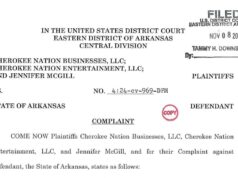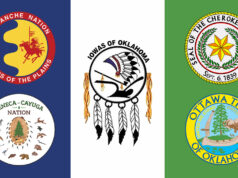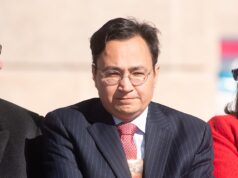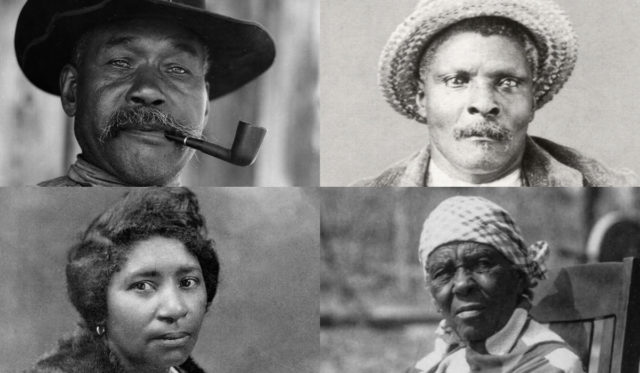

In 2016, LeEtta Osborne-Sampson, a council representative of the Seminole Nation who is Black, approached some colleagues about a disturbing picture hung on the wall of the Mekusukey Mission, which is used as the Seminole Nation council house and courthouse.
“It was a Black man sitting under a tree,” Osborne-Sampson said. “This Black man had a cloak over his head, a noose around his neck and his hands bound and his feet bound.”
Osborne-Sampson went to the Seminole Nation chief at the time, Leonard Harjo, and asked for the painting to be removed.
“You can’t get that removed,” she says Harjo told her. “It’s history.”
Osborne-Sampson is one of four members of the Seminole Nation General Council who are Freedmen — descendants of enslaved people brought to Oklahoma by tribal nations that were forcibly relocated here in the 19th century. The Seminole Nation grants Freedmen only limited citizenship rights, and three of the other five largest Oklahoma tribes don’t recognize their Freedmen as citizens at all.
Though Freedmen were guaranteed tribal citizenship by treaties signed in 1866, many of those rights have been chipped away or revoked entirely over the years. But Freedmen in all five tribes have been fighting to reclaim their status as tribal citizens, with mixed success. Despite setbacks, their efforts have gained momentum and are even the subject of a bill currently before Congress.
The history of disenfranchisement still surfaces today, Osborne-Sampson said, recalling incidents in which racist slurs and other insults were hurled at her and the other Freedmen council members. She also recalled stories of discrimination that her grandfather, Sam Osborne, who also served on the Seminole Nation General Council, used to tell her.
“To hear my grandfather tell us these things over the years I grew up, and he sat on Council as well — nothing has changed,” Osborne-Sampson said. “Racism is very high in the Seminole Nation.”
‘Their blood didn’t count’
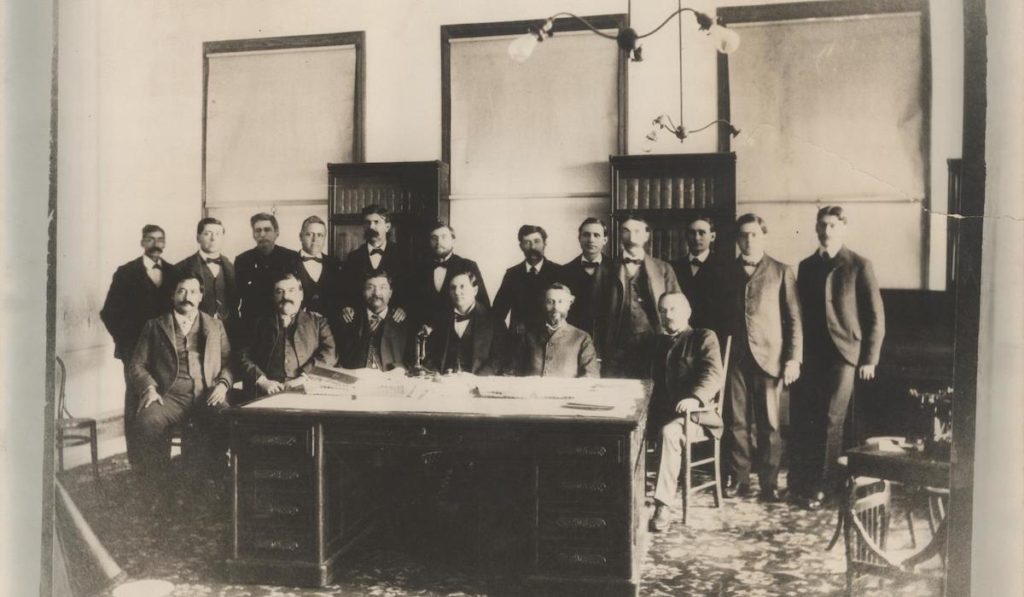
In 1866, the United States signed treaties with the Cherokee, Muscogee, Choctaw, Chickasaw and Seminole tribes which granted reservation land to each tribe and abolished slavery within the tribal nations. According to those treaties, former slaves were to be recognized as full tribal citizens.
Today, however, only the Cherokee Nation recognizes Freedmen as full citizens. The Muscogee, Choctaw and Seminole nations have since amended their constitutions in ways that exclude Freedmen, and the Chickasaw Nation never enrolled Freedmen into the tribe at all, despite treaty stipulations.
The 1866 treaties declaring citizenship rights for Freedmen are the same ones cited to reaffirm the five tribes’ reservations following the U.S. Supreme Court ruling in McGirt v. Oklahoma. Cheryl Phifer, a Chickasaw Freedman, said she sees the tribes’ unwillingness to accept Freedmen while claiming the jurisdictions given them by the McGirt ruling as hypocritical.
“They want the United States to uphold the treaty, but they don’t want to uphold the treaty either,” Phifer said.
Full citizenship in tribal nations would allow Freedmen to vote, run for office, and benefit from tribal services such as housing, education and health care, many of which are heavily funded by the federal government.
The exclusion of Freedmen goes all the way back to the institution of the Dawes Rolls in 1907, just months before Oklahoma was granted statehood.
The Dawes Rolls are a list of Native American people compiled by the federal government as part of the Dawes Act, which divided millions of acres of communal tribal land into individual allotments (which also violated the 1866 treaties). Those who accepted the divided tribal lands were allowed to receive U.S. citizenship.
“The purpose of the land allotment was to teach a concept of private land ownership, because the tribes prior to that all owned land in common,” said Angela Walton-Raji, a Choctaw Freedman author and genealogist. “Now once all the land allotments were finished, the purpose of [the Dawes Rolls] was to then open up the remaining millions of acres of land for white settlements, so Oklahoma could join the union.”
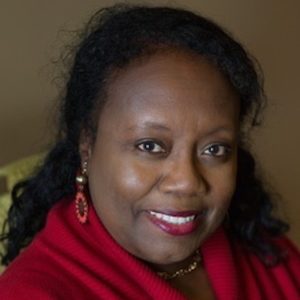
The Dawes Rolls included three categories: natives by blood, whites who had married into the tribe and Freedmen. Although many Freedmen had native ancestry, they were listed only as Freedmen, essentially erasing their blood relation to their tribe.
“They didn’t write down any blood quantum if they were Black. It was an application of the concept of a one-drop-of-blood type of thing,” said Walton-Raji. “The result was that any native blood that people who had been classified as Freedmen had, basically, their blood didn’t count. It was never recorded.”
So when the Cherokee, Muscogee, Choctaw and Seminole nations each barred Freedmen from tribal citizenship decades after the Dawes Rolls were finalized, many descendants of biracial natives were disenrolled from their tribes entirely, Walton-Raji said.
Cherokee Nation decision a victory for Freedmen
Among the five tribes, the Cherokee Nation is the only one that recognizes Freedmen as full citizens today. Freedmen had enjoyed citizenship rights until the 1980s, when the nation began excluding those not classified as “by blood” on the Dawes rolls. leading to a number of court battles. The “by blood” restriction was officially passed in a 2007 special election, and removed only recently by a unanimous ruling of the Cherokee Nation Supreme Court on Feb. 22, 2021.
On May 12, 2021, Secretary of the Interior Deb Haaland approved a new constitution for the Cherokee Nation which explicitly ensured the protection of Freedmen’s rights and citizenship.
“We encourage other tribes to take similar steps to meet their moral and legal obligations to the Freedmen,” Haaland said.
The decision to remove “by blood” was in response to a 2017 U.S. District Court ruling in Cherokee Nation v. Nash, which determined that Freedmen descendants are entitled to full citizenship rights.
Marilyn Vann — who was appointed by Principal Chief Chuck Hoskin Jr. to the Cherokee Nation’s Environmental Protection Commission in September 2021 and is the first Freedman to hold a governmental office in the tribe — was a plaintiff on the case. Vann is also the president of the Descendants of Freedmen of the Five Civilized Tribes.
Vann said the legal change has not transformed everyone’s thinking, however.
“It’s true that the Cherokee Nation since Judge Hogan’s ruling in the Cherokee Nation v. Nash and Vann case has tried to live up to its treaty rights and treaty obligations,” Vann said. “But myself, as a Freedman tribal member, I’m aware that there are persons in the Cherokee Nation who oppose Freedmen’s citizenship.”
In a December 2019 interview with NonDoc, Hoskin said he and his administration have worked hard to improve relationships with Cherokee Freedmen.
“I’m very mindful that we need to make sure all of our services and all of our accessibility to the government is done based on that core principle of equality, and that even if overt or hostile discrimination is wiped away, there can sometimes be inadvertent acts that exclude people based on their descendancy, and I want to make sure that doesn’t happen in our government,” he said.
‘I’m not sure it will ever happen. Not in my lifetime.’
In 1979, the Muscogee (Creek) Nation adopted a constitution that restricted tribal citizenship to descendants of people listed as “Indian by blood” on the Dawes Rolls.
Muscogee Freedmen have made efforts over the years to regain citizenship rights. The Muscogee Creek Indian Freedmen Band even filed an unsuccessful petition in 2011 to register as an independent, federally recognized tribe.
The group also filed a lawsuit against the Muscogee Nation and U.S. Department of the Interior in July 2018, challenging the tribe’s constitution, but the suit was dismissed in May 2019 because the plaintiffs did not provide records showing they had applied for citizenship and had been rejected within the preceding decade.
Ivory Vann (no relation to Marilyn Vann), a Muscogee Freedman and a member of the Muskogee City Council, said the 2018 lawsuit was the best shot Muscogee Freedmen have had at regaining citizenship.
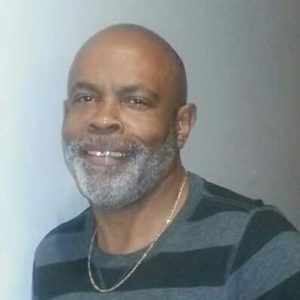
“That was the closest we’ve ever been towards doing the right thing,” Vann said. “I’m not sure it will ever happen. Not in my lifetime.”
Muscogee Nation communications director Jason Salsman said in a July 2021 interview with NonDoc that Muscogee Nation Principal Chief David Hill believes Freedmen citizenship is an issue that should be left to a vote of the people, and it could even be placed on a ballot this year. Salsman also said Hill was considering a string of town hall meetings on the issue.
Walton-Raji was skeptical of the idea of town halls to discuss Freedmen citizenship.
“Imagine having a town hall issued to discuss what is right,” Walton-Raji said. “Let’s have a discussion, shall we treat these Black people right?”
Asked about 2022 updates on the Freedmen question in the Muscogee Nation, Salsman provided a statement Thursday that community forums surrounding are expected to begin this spring:
We expect this spring to discuss the timing and logistics of community forums for Muscogee (Creek) Nation citizens to engage on the topic of citizenship eligibility for Creek Freedmen descendants.
Since we first brought up the idea of community discussion the nation has installed a new speaker of our National Council, we have navigated the issues presented by COVID and we have necessarily directed resources to not only implement McGirt, but, importantly, to protect the nation’s interests in an onslaught of legal challenges from the state.
This is a deeply personal and highly emotional issue that goes to the heart of identity for both Creek citizens and the descendants of Freedmen. The issue of citizenship eligibility also is a fundamental component of our Constitution, which can only be changed through a deliberative process that concludes with a vote of Muscogee (Creek) citizens.
Ivory Vann believes the only way Freedmen will be able to claim citizenship rights is through monetary pressure. He is a proponent of House Resolution 5195, a bill proposed by U.S. Rep. Maxine Waters (D-CA43) which would tie federal funding for tribal housing and infrastructure to compliance to the 1866 treaties.
“If you take their money, they will come to the table,” Vann said.
However, the language regarding 1866 treaties has proved controversial, and HR 5195 is in danger of stalling, while a similar bill that does not include that language was passed by the U.S. Senate Committee on Indian Affairs on Feb. 16.
‘Voting privileges only’ in the Seminole Nation
In 2000, the Seminole Nation voted to restrict citizenship to those who had one-eighth Seminole ancestry based on the Dawes Rolls, disenrolling nearly 2,000 Freedmen from the tribe.
Freedmen believe that a complicated 2002 court case regarding voting rights — Seminole Nation v. Norton — effectively upheld the Seminole Freedmen’s 1866 treaty rights, but the Seminole Nation has not granted them full citizenship as a result.
“When the Seminole Nation lost Seminole Nation v. Norton 20 years ago, they were directed by the BIA that the Seminole Freedman are members of a federal tribe, that we’re entitled to federal services,” Marilyn Vann said. “What did they do? They reissued the people’s tribal membership cards to say ‘Freedmen’ on the front, ‘00 blood quantum,’ ‘voting privileges only’ on the back.”
Today, the Seminole Nation grants only limited citizenship to its Freedmen, allowing them to vote, sit on governmental committees and hold office on the tribe’s General Council within the tribe’s two Freedmen bands. They are not eligible to hold senior leadership positions or to receive a number of services.
In October 2021, the federal Indian Health Service announced that Seminole Nation Freedmen are eligible for health care, after months of reports that the tribe was denying Freedmen COVID-19 vaccines.
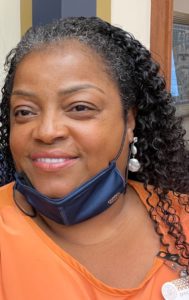
Osborne-Sampson said relatives of hers who lived near Wewoka, where the IHS has a clinic, struggled to get health care early in the pandemic.
“Since COVID started in 2020, I have 17 family members that died of that, in that area,” Osborne-Sampson said. “There’s no doctor. You had to go 50 miles out just to get help, but that clinic sat right there.”
In November 2021, Osborne-Sampson met with Seminole Nation Chief Lewis Johnson and Assistant Chief Brian Thomas Palmer, who were elected in July and August respectively, to discuss the future of Freedmen in the tribe.
“They told us that they wouldn’t do anything different than the former chiefs, because they’re only going to go by what the Council says,” Osborne-Sampson said. “We took that as, you’re not trying to pull the nation together as one.”
Now, Osborne-Sampson and other Seminole Freedmen are preparing to pursue legal action by reopening Seminole Nation v. Norton.
“We are looking to take them back to court, to Washington federal courts and reopen that case to ask for our citizenship to be recognized and given,” said Osborne-Sampson. “The judge already granted us this, but we need to open it again to show that [the Seminole Nation leaders] have not done anything.”
A spokesman for the Seminole Nation said Chief Lewis Johnson had no statement regarding the citizenship question for Freedmen at this time.
Will the Choctaw Nation have a ‘meaningful conversation’?
In 1983, the Choctaw Nation created a new constitution that said tribal citizens must be descended from “by blood” citizens on the Dawes Rolls.
On July 1, 2021, Choctaw Chief Gary Batton wrote an open letter announcing an initiative to consider membership for Choctaw Freedmen.
“Today we reach out to the Choctaw Freedmen. We see you. We hear you. We look forward to meaningful conversation regarding our shared past,” Batton wrote.
Walton-Raji said the Choctaw-Chickasaw Freedmen Association (of which she is a member) and other Freedmen groups have inquired about starting the promised discussion but have not heard back.
“We have not heard anything as of yet, and perhaps it was never received. We don’t know,” Walton-Raji said. “But we wrote a letter immediately to Chief Batton’s office.”
What Walton-Raji does know is that members of Freedmen organizations have been following tribal council meetings since Batton’s open letter, and Freedmen have not been discussed so far.
“It’s not a discussion, it’s not on any of the agendas,” she said.
So, while the open letter is encouraging, Walton-Raji said she is not sure if there will be any further action from Batton.
“He’s maybe considering it, but it might just be a private thought. It’s never come up officially,” she said. “At least, it doesn’t seem as if there’s any action to go beyond the open letter.”
Randy Sachs, director of public relations for the Choctaw Nation, said tribal leaders had no further comment on the Freedmen question as they are “still evaluating the situation.”
‘Eventually, right is going to come’ in the Chickasaw Nation
The Chickasaw Nation jointly signed a Reconstruction treaty with the Choctaw Nation in 1866 but never enrolled its Freedmen as full citizens, as required in the treaty.
“In the Chickasaw Nation, it’s just a bunch of frustrated people who know they were never given citizenship,” Walton-Raji said.
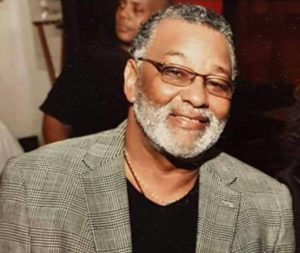
Because the tribe never enrolled its Freedmen in the first place, Chickasaw Freedmen have a worse chance at winning a lawsuit regarding their citizenship, Walton-Raji said.
“They failed to do their judiciary duties for us,” said Verdie Triplett, a Chickasaw Freedman and Choctaw by blood.
Because they were never brought into the tribe, Chickasaw Freedmen were left without a nation until Oklahoma joined the union, in 1907, and without U.S. citizenship until Congress enacted the Indian Citizenship Act in 1924.
“They broke the treaty and have been allowed to continue business as usual since that time,” Walton-Raji said.
In response to Secretary of the Interior Deb Haaland’s asking tribes to uphold their “moral and legal obligations to the Freedmen,” Chickasaw Nation Gov. Bill Anoatubby said in a statement that “Chickasaw citizenship is a matter of sovereignty and is clearly defined in the Chickasaw Constitution.”
Triplett said he is not sure what the path toward citizenship entails, but he remains optimistic that Chickasaw Freedmen will eventually receive citizenship.
“I really don’t know what it’s going to take. I don’t know if it’s going to happen in my lifetime,” Tripplett said. “But eventually, right is going to come, it’s going to become reality. These tribes cannot continue to do what they’re doing because what they’re doing is wrong, and wrong is not going to prevail.”









